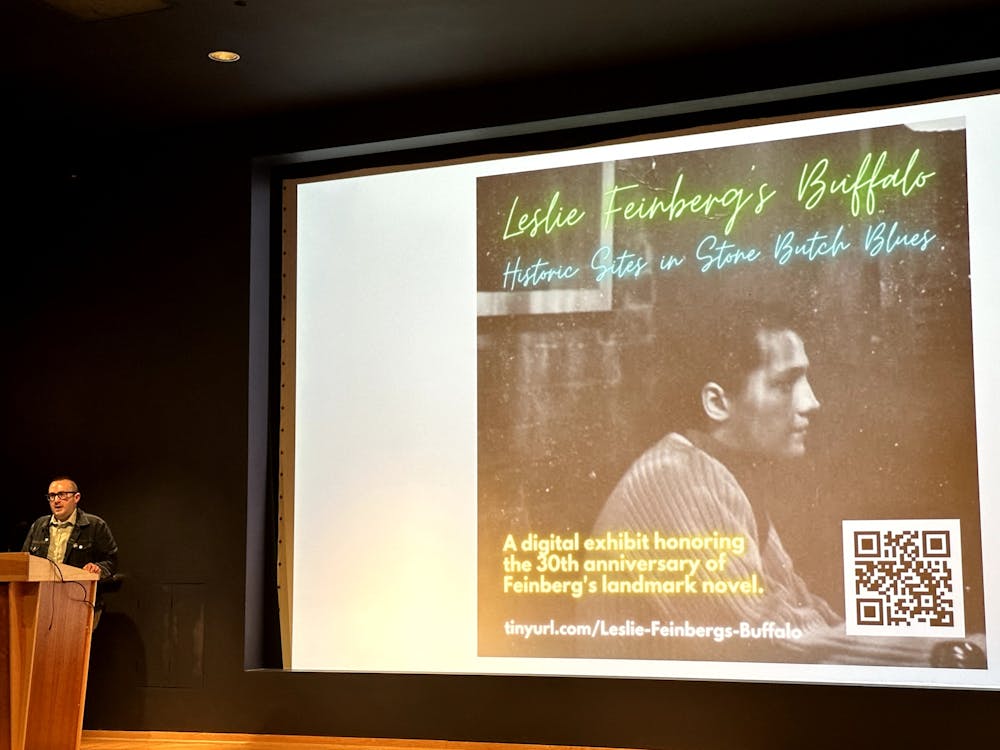Historic preservationist Jeff Iovannone discussed conserving LGBTQ+ spaces in Western New York as a part of the UB Gender Institute’s Signature Lecture series on Oct. 12.
Inspired by Leslie Feinberg’s “Stone Butch Blues” — a fictional story detailing a young lesbian’s life in 1970s New York State — Iovannone curated an online map consisting of historical sites featured in the novel, many of which are found in Buffalo. The exhibit — titled “Leslie Feinberg’s Buffalo” — encompasses bars, communal houses and other safe spaces for LGBTQ+ people to connect with each other.
During the exhibit’s creation, Iovannone directed his efforts toward highlighting the buildings’ social and cultural history, not just their architectural structures.
“We have to think about the preservation and conservation of all of those intangible pieces that are connected to the place,” Iovannone said. “To move beyond the place to the stories that the place allows us to share and tell.”
But the research required to “move beyond the place” isn’t easy. Not every building mentioned in the book survives, and sometimes researchers are left with more questions than answers.
Buildings that were stylishly pleasing and tailored toward a heteronormative, middle-class family often survived. Other ones, dedicated to queer, working-class people, were often demolished. To Iovannone, the disparities posed an obstacle to the exhibit’s creation and endangered the preservation of LGBTQ+ history.
“If we’re only focusing on aesthetically beautiful architecture, more often than not, the story we are telling is the story about white people with privilege,” Iovannone said.
The difficulty of documenting these buildings’ stories was amplified because many sites were hidden. Due to the homophobia, racism and police brutality LGBTQ+ people experienced during the 1970s, many locations were only discovered by word-of-mouth.
Iovannone turned into a different kind of documentation, depending on the concept of “storyscape,” a concept borrowed from Pratt Institute professor and fellow preservationist Ned Kaufman.
“[Storyscape] is centered around any place that has an important story attached to it. It gives official recognition to places that might not physically exist but its story lives on,” Iovannone said. “It reminds us that it’s still important to commemorate the story even though the physical location is lost.”
The challenges rarely end when a surviving building is found. The next — and hardest — step is officially recognizing it as a historical landmark, a process Iovannone described as being “total luck.”
One notable example is Firebrand Books, a former feminist and lesbian-owned publishing company in Ithaca. Now called “the Yellow Deli,” the store is owned by the Twelve Tribes, a homophobic cult. The LGBTQ+ community has faced difficulties in filing the necessary paperwork for a national landmark nomination, since that designation requires the current owners’ consent.
Iovannone says the Firebrand building is an example of what to do when LGBTQ+ spaces and places are contested.
“Sometimes in the landmark field, we are so focused on formal designation that we’re not thinking about other strategies that we can bring in from the public history field,” Iovannone said.
The initial denial resulted in art-based protests. A group of Cornell students used sidewalk chalk to create their own plaque recognition of the building. A local artist plastered informational posters on street lamps, urging people to boycott the Twelve Tribes’ establishment.
In the end, the Firebrand Books site officially got recognized last year. Even though there is now an official marker, Iovannone says that more work needs to be done. Documentation is only one of the steps to bringing together a community and “helping them feel like they belong.”
With the change in ownership and or demolition of many spaces it becomes increasingly important to preserve what is left for the local community.
“I’m new to Buffalo, and I’m also interested in LGBTQ history,” Andrea Pitts, a UB comparative literature professor, said. “I thought the Q&A was a nice way of trying to bring out some of those questions about the sites that I don't know and in trying to navigate the city now as a Latinx, queer and trans person myself.”
CORRECTION: This article has been updated to accurately reflect comments made by Andrea Pitts. We regret this error.
The arts desk can be reached at arts@ubspectrum.com.
Sophia Stines is an assistant features editor.

Mylien Lai is the senior news editor at The Spectrum. Outside of getting lost in Buffalo, she enjoys practicing the piano and being a bean plant mom. She can be found at @my_my_my_myliennnn on Instagram.





